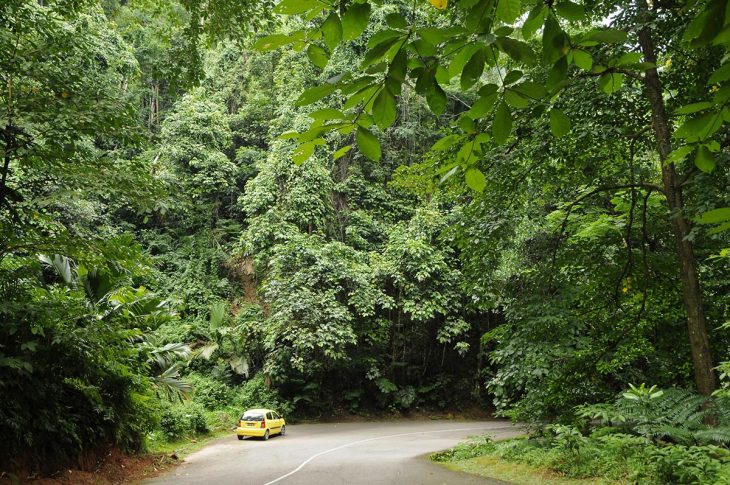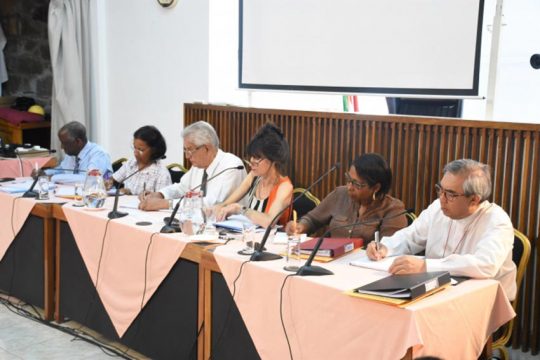Bryan Charles Victor was 21 years old at the time. Victor survived, but his two friends were not so lucky. Thirty-seven years later, he is still trying to make sense of the events of July 23, 1983. Victor’s two-hour long emotional testimony shook the Seychelles islands, with people taking to social media to condemn the atrocities committed during the 15-year one-party era. As the Truth, Reconciliation and National Unity Commission (TRNUC) continues to hear testimonies about murders, disappearances and other alleged violations of human rights, more victims are coming forward to seek redress for atrocities.
Victor and Sonny Elizabeth worked together at the Post Office and became friends. Soon after he left his job at the postal services, Victor bought a car and was approached by three soldiers, who asked him to be their driving instructor. Michael Hoffman was a friend of Elizabeth and knew the soldiers as well. “During some of those driving classes, Elizabeth and Hoffman would accompany me, you know just for fun, a ride”, recalls Victor.
“On our way, I heard talks about guns”
Until that day when what was supposed to be a simple errand to collect “something at Sans Soucis”, a mainly forested sub-district bordering the two main districts of Bel Air and Port Glaud, turned into a nightmare. On July 23, 1983, Elizabeth asked Victor to drive him, Hoffman and the soldiers at around 7pm. “He would not divulge what ‘the something’ was at first. It was when we were on our way that I heard talks about guns. Sonny said Hoffman is going to collect some guns from [a guy called] Marengo. I didn’t know whether it was one gun, 5 guns or 500 guns,” recounted an emotional Victor. Jemmy Marengo was a former schoolmate of Victor, who had become an army intelligence officer.
They meet Marengo at Sans Soucis, who gets into their vehicle to guide them. Victor says he was not alarmed, until his car was ambushed. “Marengo told me to leave the main road and I remember going off road into a pathway when suddenly I came across a tree trunk - the size of my thigh - across the road. And out of nowhere, we were ordered to get out of the car, and we saw soldiers coming out of the bushes from either side of the car,” recounts Victor. Everything then spiralled out of control, he told the commission.

“Let him be, he will die eventually”
“The soldiers – between 15 and 20 – were armed with sticks, daggers, bayonets and AK47s and they started beating all three of us to death,” says a tearful Victor. “I knew karate, so I initially fought back, but they were many and they overpowered me. When I couldn’t take it anymore, I gave up, broke down and started screaming for my mother as I knew I would never see her again. Their intention was to kill us,” he adds. He lay still on the ground and couldn’t see what happened to Elizabeth and Hoffman. “I was hit with the bayonet in my back and on my head. At one point one of them said ‘let him be, he will die eventually’”.
Their three bodies were loaded into his car, and driven towards Morne Blanc, Port Glaud on the western side of the main island Mahe. In a secluded area, the car was pushed into a ravine. “The car didn’t roll over. It went down slowly and suddenly came to a halt against a small tree. I believe there was a god that stopped the car that night,” Victor tells the commission. “I was scared, bleeding. No sound was coming from Hoffman, but [Elizabeth] was moaning, ‘mother, mother’”. Victor managed to climb onto the main road. He finally came across a house and was assisted by an elderly man who called the police. “I told them about my two friends, but the two police officers said they would not go to the site in the middle of the night. I don’t blame them. I understand. We were all scared in Seychelles at the time.”
Recovery, threats and intimidation
“I was hospitalized for eleven days and had regular hospital visits for weeks after that. I was traumatized and scared. I would never go to any place alone. I was always accompanied by a family member,” recalls Victor. “My family and I were persecuted and intimidated. At night we would hear people walking outside our house. You know, the sound of army boots. I remember my uncle Eugene would come stay with us. He slept with two machetes in case we were attacked in the middle of the night”.
“My mother would fill up four huge thermos with hot water. This was our defence, in case the soldiers came for me.” A police commissioner, James Pillay, questioned him during that time, Victor says. “I told him about the beating, the army’s involvement and specifically the role of Jemmy Marengo in the attack. But he said it could not have been Marengo as he had learned that he was on another island that day. He told me that I had made a mistake and I was probably drunk and could not remember what had happened to me that night,” an angry Victor tells the commission.

Marengo, the former intelligence officer, gave more details before the Commission on October 14, 2019. To him, Hoffman was part of an assassination plot. He “regrets what had happened”, but “if we had not intercepted the three men that day, many more people would have died, including President France Albert Rene”. “One day Hoffman said (…) that some soldiers had hidden guns in the bushes at l’Exile army camp, at Sans Soucis, where I was based. And he needed my help to go through the main gate, which was guarded, to collect the guns. I knew that they wanted to assassinate president Rene,” recalled Marengo. “I facilitated their entrance and then I got out of the car and left. The next day I heard they were in an accident and that two of them died,” said Marengo.
Exile, with the help of the American ambassador
In October 1983, three months after the attack, fearing for his life, Victor sought the help of the then American ambassador to Seychelles, David Fischer, to flee the country. “Mr Fischer said he would contact a friend of his, Ted Fletcher, who was working for the International Rescue Committee branch in Boston, USA. Everything was done secretly as I didn’t want to tip off the authorities of my imminent departure,” says Victor.
According to him, there was a second attempt on his life on December 31, 1983. “We were at the end of year party. I noticed four soldiers, and one of them approached me with a dagger, but there was a scuffle and the other party-goers noticed what was happening. The four were eventually chased away. We slept at a friend’s house that night. We were scared of going home.” “Less than two months later, everything had been sorted out for my trip. I didn’t know where I was going but I knew that if I stayed in Seychelles I would die. I had no choice. So, in February 1984, I went into exile,” recalls Victor. He would return to Seychelles for the first time in 1993, when the country became a multi-party democracy.
“Albert Rene [the former President] knew everything that was happening especially that night, and I strongly believe that he was the one who ordered the army personnel to kill my two friends and I,” Victor claims, before a packed room including members his family and the American ambassador. Many points remain to be clarified. But Following Victor’s testimony on January 13, the Seychelles Peoples Defence Forces announced that Captain Marengo had retired.






